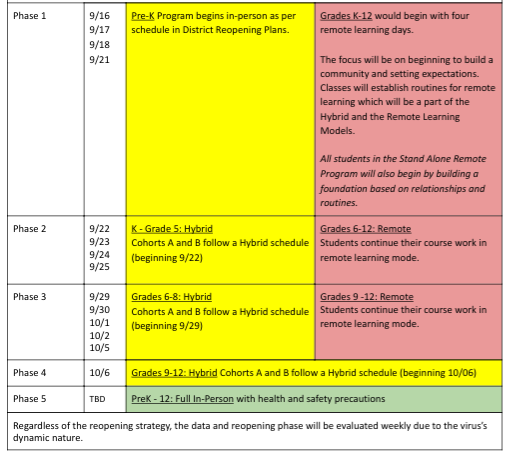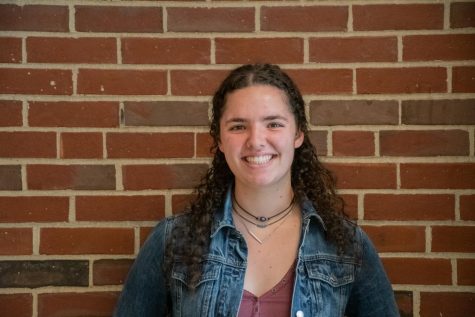School committee approves phased hybrid reopening strategy

In the phased strategy shown, high schoolers will participate in full remote learning from September 16 to October 6, after which a hybrid model will be executed.
August 14, 2020
During the August 12 combined school committee meeting, a differentiated approach was approved by all three school committees as the reopening strategy for the 2020-21 school year.
The meeting was held as a public zoom and stretched from 6 p.m. to 1 a.m. the following day.
In this phased plan, the high school will begin the school year with remote learning and transition to a hybrid plan on October 6. Eventually, the goal is to have all grades completely in-person; however, that start date is TBD and dependent upon future health metrics.
“We feel it is a model that prioritizes the physical, social and emotional well-being of the school community, students and staff,” Superintendent of Schools Greg Martineau said in the meeting.
Health professionals also gave their approval of moving forward with the plan based on the safety measures being put in place.
“We need low community transmission rates and we need the availability of all of these mitigation strategies the district has been working so hard to put into place,” medical advisor Dr. Andrea Ciaranello said in the meeting. “…I think we have to assume realistically that there will be some people who come in with COVID, who enter each school, a few times during the semester but what we can be confident in is that all of these prevention approaches will work to prevent that spread from going through the school.”
At a previous meeting, the committee voted to take advantage of the ten professional development days recommended by the Commissioner of Education at the beginning of the year, pushing the start of school to September 16.
Originally, the hybrid start date for Algonquin was October 13, but after committee concerns about a lack of student-teacher interaction, an amendment was made moving the date up a week.
“Building meaningful relationships and connections with teachers is critical,” Regional School Committee Member Sean O’Shea said in the meeting. “The most important factor for success for students is the teacher standing in front of them…. I’m worried and very concerned about high school students missing the opportunity to meet teachers and build relationships with them.”
School district physician Dr. Safdar Medina also expressed concerns about students’ lack of in-person learning as there has been an increase in mental health concerns as a result of social isolation and obesity.
“Looking at [the rise in mental illness and obesity] combined with our state’s low metrics with COVID-19 and where our positivity rates are, I think it makes a very compelling case that children need to be in school,” Medina said in the meeting.
In addition to approving a reopening plan, principal Sean Bevan presented a new sample schedule for remote learning that increased learning time and rigor from the spring semester’s schedule. It also included a “What I Need” (WIN) block at the end of the day to allow students to work towards their own goals and meet with teachers one-on-one.
“The idea of both [the remote and hybrid] schedules is that they restore the basic skills and routines students are going to need to be successful in any model either fully remote or hybrid or fully in-person and that they mirror our everyday schedule in a regular year,” Bevan said in the meeting.
While the administration is aware building connections will be harder this year, they are confident the staff is ready for the challenge.
“I think teachers are going to be working very hard to build those relationships, but in new ways than they have in the past,” Assistant Superintendent of Schools Stefanie Reinhorn said in the meeting.
On Friday, August 14, the plan will be submitted to the Massachusetts Department of Elementary and Secondary Education (DESE).









